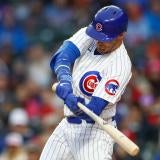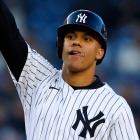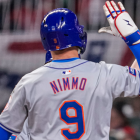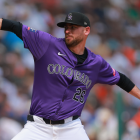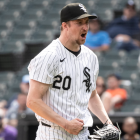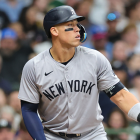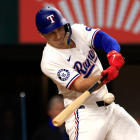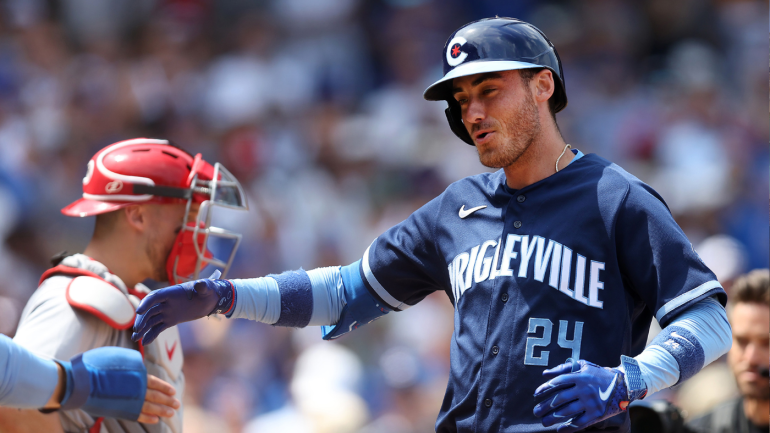
On Monday, July 17, the Chicago Cubs lost to the last-place Washington Nationals. The loss dropped the Cubs to 43-50, 8 1/2 games out in both the NL Central and from the third and final NL Wild Card. That's absolutely "sell" range in front of the trade deadline, which was just about two weeks away.
Instead, here we are a few hours after the deadline and the Cubs were actually buyers. What happened in between to change the calculus was a lot of winning along with some help from others -- in particular, the Diamondbacks, Marlins and Giants -- who did a lot of losing. The Cubs went 10-3 and entered the deadline five games back in the NL Central and only 3 1/2 out of the third and final NL wild-card spot.
I'm sure some disagree, but that's absolutely "buy" territory. You surely don't sell, which means there was no way Cubs president Jed Hoyer and company could look to take advantage of a sellers' market.
It'll be interesting when the dust settles on the 2023 season to see how the Cubs fared here in the last two weeks, but I believe the path they took was the correct one for the long-term health of the organization.
Would selling have really been much better?
For weeks, we heard about how the Cubs had two excellent trade chips in former MVP Cody Bellinger and All-Star starting pitcher Marcus Stroman. If a sell-off was happening, perhaps some value could have been extracted from the likes of Kyle Hendricks, Yan Gomes and Drew Smyly, too. This still left in place cornerstones like Dansby Swanson and Nico Hoerner while also adding to the farm system and looking ahead.
One issue is that filler prospects for players like Gomes and Smyly almost never end up amounting to anything but organizational depth, so it would be trading for the sake of trading with everyone except Stroman and Bellinger.
It should be noted that Stroman did some mighty fine work in crushing his own trade value the last several weeks, compiling a 9.00 ERA in his last seven starts. I suspect he'd still have brought something back, but it hardly would've been a coup for the franchise.
Bellinger is playing some of his best baseball since winning the 2019 MVP. There were hardly any quality bats available on the trade market, so the argument for selling boils down to the Cubs landing a big package in return for Bellinger and hoping there was still a pretty nice market for Stroman.
The funny thing is, the Cubs just traded a former MVP during an All-Star season. Kris Bryant in 2021 brought back Alexander Canario and Caleb Killian. Neither has ever been ranked by a major outlet as a top-100 prospect. Killian is now 26 and has fared terribly in his four MLB appearances. Canario had a big power season in 2022 but suffered a serious injury late last year and has played in 13 games for Triple-A Iowa this year (hitting .220/.316/.320).
Both could still pan out, but they are essentially lottery tickets.
With the Cubs only 3 1/2 games out of a playoff spot at the deadline, you'd be hard pressed to convince me the organization absolutely had to add something like, what, three or four decent prospects for Bellinger and Stroman at the expense of the big-league team pushing relevance. If you could guarantee a Juan Soto package, maybe, but this wasn't even close to that situation.
Short-term gains
The argument against buying and for selling would revolve around the Cubs' low playoff odds for this season. It's a waste of resources to try and make the playoffs if you only have a 24.5% chance [per Fangraphs] to make the playoffs, the argument goes.
Man, I'm so sick and tired of this thought process. It's not a zero percent chance. It's not five or 10. Why dismiss a one in four chance like it's some sort of pie-in-the-sky fantasy? Not only that, but how are postseason odds such an authority on how a team should act? What a bunch of nonsense.
The Cubs are playing great baseball right now. The fans in Wrigley Field are back into the team like they haven't been in a few years. They are having fun. Shouldn't that count for something? It makes a free-agent sell-job to future players much easier -- that is, showing prospective free agents how much fun it would be to play in a situation where the team is serious about winning and the fans are coming out in droves to support the team. It's a hell of a lot better than trying to convince players to sign after veterans are sold off at the trade deadline while perfectly within a reasonable distance of contention.
It takes a lot of money too, of course, and the Cubs have that. They should be able to continue spending money in free agency the next several seasons just like they did this past offseason.
Let's also keep in mind that after a tough schedule this week, five of the following six series are against sub-.500 teams. They have a real chance to make a move here.
As if it weren't crystal clear thus far, yes, I was totally against the Cubs being sellers once they crawled to within contention. I absolutely loathe the idea of giving up with two months left when in striking distance in the hope of prospects panning out when it's been proven a large percentage don't. It's true. Baseball America published an article Tuesday noting that roughly 20% of prospects traded at the deadline have a big-league career of consequence.
Now that we've arrived at "the Cubs should not sell" as a conclusion, the next reasonable conclusion is they should buy. Given where they are with the farm system and the big-league roster, though, they were also reasonably in the range that this called for an "add at the margins" job with a scalpel rather than going all out to win it all, like in 2016 and the ensuing few years.
The biggest hole on the roster was first base. The Cubs added Jeimer Candelario to be the everyday first baseman. They could've used some bullpen depth, so they added Jose Cuas.
These moves might not be enough to push the Cubs into the playoffs. Hell, they probably aren't. I think they needed more bullpen depth and the offense still probably lacks a little punch. Playing meaningful baseball in September for the first time since 2019 can help propel them into a bigger move in 2024, though, and that shouldn't be discounted.
Bottom line
I've been critical of Hoyer in the past -- less than two months ago, in fact -- but he seemed to do all he could here with the hand he was dealt. Of course, he was dealt a lot of this hand by his own doing, but it would've been far easier on him if the team kept playing terribly and he was justified in trading Bellinger and more.
Ultimately, my gut feeling is the recent hot streak and the chance to parlay down-the-stretch success into more upward movement in 2024 and beyond was much more beneficial for the franchise than whatever a Bellinger and Stroman sell-off was going to bring. Call it a moderately successful deadline with eyes toward the continued improvement with the big-league roster in 2024.









